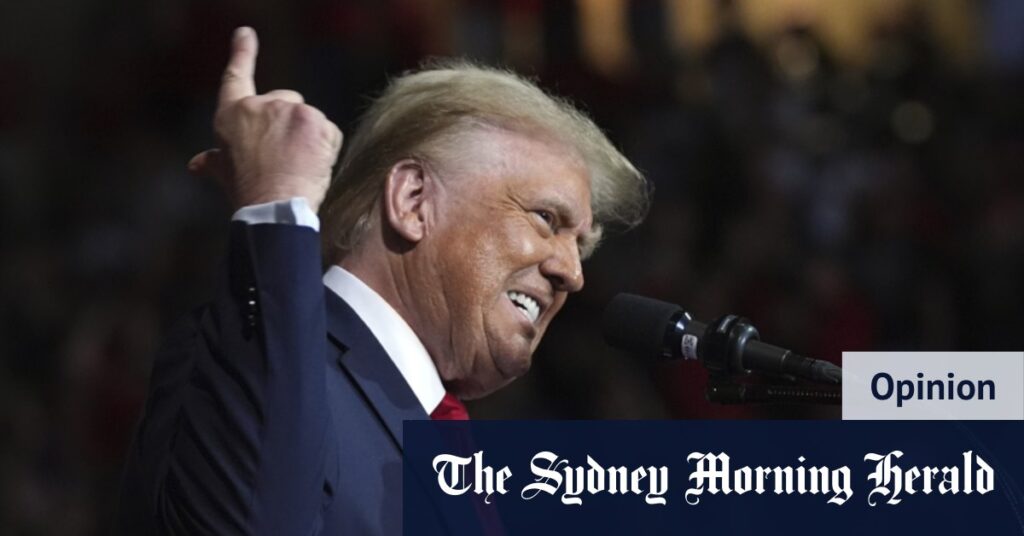If, as I fear is likely, Donald Trump wins this week, future historians will mark November 5, 2024, as one of the turning points of the 21st century. We have become so wearily cynical about overblown campaign rhetoric proclaiming every election to be “the most important in our lifetimes” that, as in the fable of the boy who cried wolf, we write off every alarm as alarmist. Our senses become so dulled by incessant overstatement that when the real threat arrives, we are slow to recognise it.
Trump is not a conservative. He is a radical.Credit: AP
The word “fascist” is usually a term of abuse that falls easily from the lips of excitable undergraduates and ratbag agitators. Remarkably, it is now the considered judgment upon Trump of respectable senior generals such as former chairman of the Joint Chiefs of Staff Mark Milley, and Trump’s former chief of staff, John Kelly. Never before has the presidential candidate of a major party failed to secure the endorsement of a single previous candidate of the same party. Even Dick Cheney – who, as George W. Bush’s vice president, was regarded by the left as a figure so evil that he was caricatured as a James Bond villain – has endorsed Kamala Harris.
Never before have so many alarm bells been rung about a Republican candidate by so many conservatives. The warnings of sober people like Milley and Kelly – not political figures but military officers bred in an ethic of service – cannot be written off as hysterical campaign overstatement. Only a fool – or a Fox News propagandist – would dismiss them.
Yet, ironically, this is part of Trump’s almost mesmeric appeal to his base. The more often that respectable conservatives, or members of the national security establishment, denounce him, the more compelling his pose as the champion of the alienated becomes. In a nation in which suspicion of government runs deep, Trump’s narrative – that he, like his followers, are victims of “the deep state” – resonates. Far from being a conservative, Trump is a radical, a disruptor. His appeal works not just with those who feel themselves marginalised by economic and social change, but it also reaches “tech bro” billionaires such as Elon Musk, who see themselves as disruptors, too.
Whether or not Trump is rightly described as a fascist, a demagogue he certainly is. And if the history of the past century has taught us anything, it is surely to take demagogues seriously. They usually mean what they say. The great paradox of this election is that a notorious and systematic liar can probably be trusted to keep his promises.
Loading
So we already have a pretty clear idea of what a second Trump presidency would look like. On day one he would abandon Ukraine – he has virtually said so already. One of the most remarkable moments of the campaign was when, during his debate with Kamala Harris, he was asked who he wanted to win the war. Not once, but twice, he conspicuously declined to say. He has said, repeatedly, that he would end the war in his first 24 hours in office.
There is only one way that can happen: by stopping US military support and forcing Volodymyr Zelensky into a negotiation in which Russia would hold all the cards. And so the most serious violation of international law since World War II would be validated, the aggressor would be rewarded, and Zelensky – whom less than three years ago the world not implausibly compared to Winston Churchill – would be thrown to the wolves.
The message to other dictators could not be clearer: under Trump, America will not defend its allies. Does anyone seriously believe Putin would not read the abandonment of Ukraine as a green light to press Russia’s other territorial objectives in surrounding states to its south and west? Does anyone seriously believe Xi Jinping would not read the same signs and come to the same conclusion about his own claims upon Taiwan?
Read the full article here
